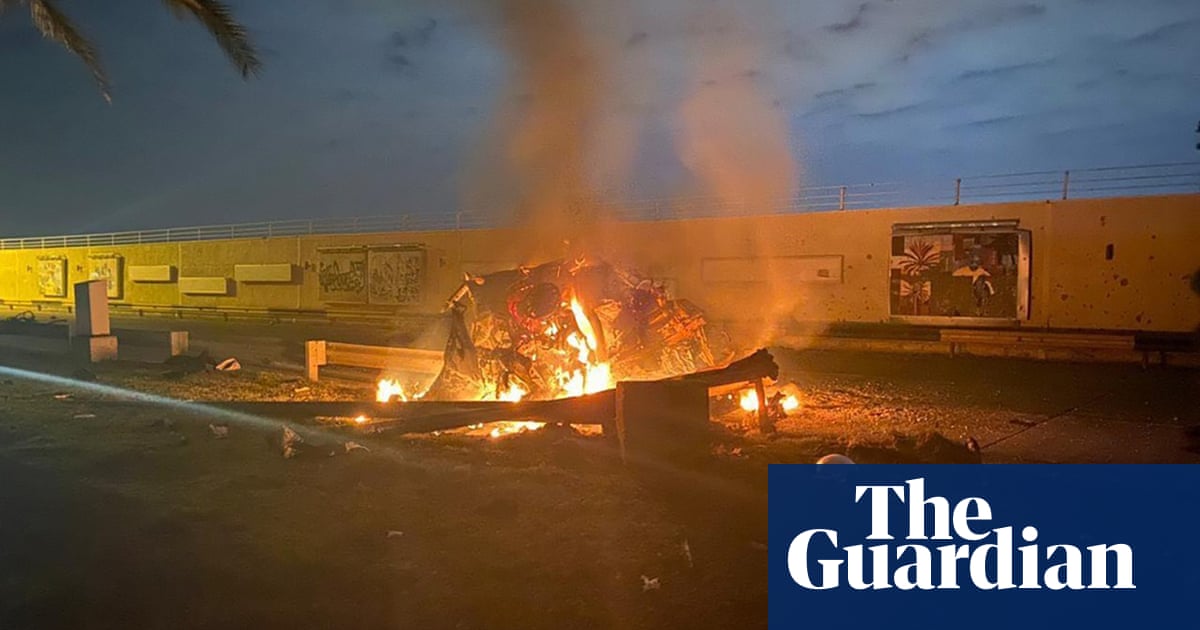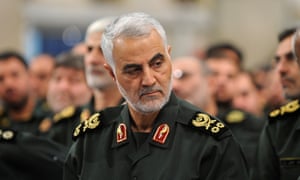Fears of conflict spread as Trump appears to taunt Iran, saying it has never won a war

Iran has vowed to take revenge for a US drone strike that killed its most powerful general, as the US secretary of state attempted to minimise the fallout from the dramatic attack by stating Washington was committed to de-escalation.
The Iranian supreme leader, Ali Khamenei, ordered three days of mourning and declared that the US would face severe revenge for the killing of Qassem Suleimani, who ran Tehrans military operations in Iraq and Syria.
The 62-year-old general died when his car was targeted by a drone in the Iraqi capital, Baghdad, as local allies from the Popular Mobilisation Forces (PMF) were driving him from the airport. The de facto leader of the PMF, Abu Mahdi al-Muhandis, a close Suleimani associate, was also killed in the attack.
General Suleimani was actively developing plans to attack American diplomats and service members in Iraq and throughout the region, the secretary of state, Mike Pompeo said. This strike was aimed at deterring future Iranian attack plans.

Allegations have been raised, including
Speaking to CNN, Pompeo claimed the targeted killing prevented Suleimani from carrying out an imminent attack on Americans in the region.
He provided no evidence to back up his statement.
I cant talk too much about the nature of the threats. But the American people should know that the presidents decision to remove Qassem Suleimani from the battlefield saved American lives, he said.
Minutes before the US claimed responsibility for the attack, Donald Trump, who ordered the strike, tweeted a picture of a US flag without comment.
Later on Friday, and not long after Pompeo said the US wanted to de-escalate the situation, Trump appeared to bait Iran with another tweet.
Iran never won a war, but never lost a negotiation! the president said, possibly in reference to the Obama-era nuclear agreement which Trump criticised and later withdrew from. Trump later tweeted that Suleimani should have been taken out many years ago.
The Iranian president, Hassan Rouhani, said Suleimanis martyrdom would make the country more determined to resist America. With no doubt, Iran and other freedom-seeking countries in the region will take his revenge, he said.
Irans foreign minister, Mohammad Javad Zarif, said on Twitter the killing was an extremely dangerous & a foolish escalation. The US bears responsibility for all consequences of its rogue adventurism.
Tehrans Lebanon-based ally Hezbollah also promised to avenge the killing. In Iraq, Hadi al-Ameri, an Iran ally and head of the paramilitary Badr Organisation, called on all Iraqi factions to expel foreign troops.
No Iranian official detailed what type of retaliation was being planned or for when. Washington and its regional allies Israel and Saudi Arabia, who also see Tehran as an arch-foe, all braced for potential reprisals.
The US Democratic presidential candidate Joe Biden said Trump had tossed a stick of dynamite into a tinderbox. His fellow Democratic hopefuls Elizabeth Warren and Bernie Sanders warned the attack could spark a disastrous new war in the Middle East.
Timeline
The build-up to Qassem Suleimani’s death
A rocket attack on an Iraqi military base near Kirkuk kills an American contractor and injures US and Iraqi soldiers. The US blames Shia militia group, Kataib Hizbullah (KH)
The US conducts retaliatory airstrikes against five KH bases in Iraq and Syria, saying there had been 11 attacks against Iraqi bases hosting coalition forces in Iraq over the past two months
Protesters storm the US embassy in Baghdad, trapping diplomats inside while chanting Death to America and slogans in support of pro-Iranian militias. At one point they breached the main gate and smashed their way into several reception rooms. The rampage was carried out with the apparent connivance of local Iraqi security forces who allowed protesters inside the highly protected Green Zone
In a drone strike ordered by US president Donald Trump, the US kills Iranian general Qassem Suleimani while he was being transported from from Baghdad airport
Suleimani was commander of the Quds force, the elite, external wing of Irans Revolutionary Guards, which the Trump administration designated a terrorist organisation in April last year. A Pentagon statement accused the Quds force of being responsible for the deaths of hundreds of US service members and the wounding of thousands more.
Many considered Suleimani to be the second most powerful person in Iran, behind Khamenei, and arguably ahead of Rouhani. Through a mix of security operations and diplomatic coercion, he has been more responsible than anyone else for projecting Irans influence in the region. This has been led in Iraq, but also by establishing a seemingly permanent military foothold in war-torn Syria, linking Iran to the Mediterranean and a land border with Israel.
Hours after his death on Friday, Suleimanis position was filled by a deputy commander, Brig Gen Esmail Ghaani, Iranian media reported.
The assassination had followed a tit-for-tat series of strikes by the US and Iran, protagonists in Iraq since late 2006. Suleimani had been central to almost all that Iran did and senior officials under Barack Obama considered him close to untouchable.
Profile
Who was Qassem Suleimani?

Qassem Suleimani, killed by a US drone strike in Baghdad, had become well known among Iranians and was sometimes discussed as a future president. Many considered Suleimani to have been the second most powerful person in Iran, behind supreme leader of Iran Ali Khamenei, but arguably ahead of President Hassan Rouhani. He was commander of the Quds Force, the elite, external wing of the Irans Islamic Revolutionary Guard Corps, which the Trump administration designated as a terror organisation in April last year.
He was born in Rabor, a city in eastern Iran, and forced to travel to a neighbouring city at age 13 and work to pay his fathers debts to the government of the Shah. By the time the monarch fell in 1979, Suleimani was committed to the clerical rule of Ayatollah Ruhollah Khomeini, and joined the Revolutionary Guards, the paramilitary force established to prevent a coup against the newly declared Islamic Republic.
Within two years, he was sent to the front to fight in the war against the invading Iraqi army. He quickly distinguished himself, especially for daring reconnaissance missions behind Iraqi lines, and the war also gave him his first contact with foreign militias of the kind he would wield to devastating effect in the decades to come.
By the the time the Iraq government fell in 2003, Suleimani was the head of the Quds force and blamed for sponsoring the Shia militias who killed thousands of civilian Iraqis and coalition troops. As fighting raged on Iraqs streets, Suleimani fought a shadow war with the US for leverage over the new Iraqi leadership.
Once described by American commander David Petraeus as a truly evil figure, Suleimani was instrumental in crushing street protests in Iran in 2009. In recent months outbreaks of popular dissent in Lebanon, Iraq and Iran were again putting pressure on the crescent of influence he had spent the past two decades building. Violent crackdowns on the protests in Baghdad were blamed on militias under his influence.
Eighteen months before his death, Suleimani had issued Donald Trump a public warning, wagging his finger and dressed in olive fatigues. You will start the war but we will end it.
The strike came at a time when Iraq was already on the brink of an all-out proxy war, and hours after a two-day siege of the US embassy in Baghdad by a mob of PMF militants and their supporters. The Pentagon accused Suleimani of having masterminded the mob attack.
That siege followed US airstrikes on camps run by a PMF-affiliated militia particularly closely aligned with Tehran, which in turn was a reprisal for that militias killing of a US contractor in an attack on an Iraqi army base on Friday.
The US has deployed 750 airborne troops to Kuwait as a rapid reaction force available for use in Iraq, and officials have said up to 3,000 could be sent in the coming days.
Suleimanis death leaves Iraq and the region on the brink of a new upsurge in violence, with Trumps and Khameneis moves and counter-moves hard to predict.
Trump authorised the strike at a time when the US Congress was in recess, and the White House framed the action as an act of self-defence in the context of counter-terrorism operations. But Democrats and perhaps some Republicans in Congress will see it as an usurpation of the legislatures authority to decide matters of war and peace.
One reason we dont generally assassinate foreign political officials is the belief that such action will get more, not less, Americans killed, the Democratic senator Chris Murphy said on Twitter. That should be our real, pressing and grave worry tonight.
Original Article : HERE ;
from MetNews https://metnews.pw/iran-vows-revenge-for-us-killing-of-top-general-qassem-suleimani/
No comments:
Post a Comment